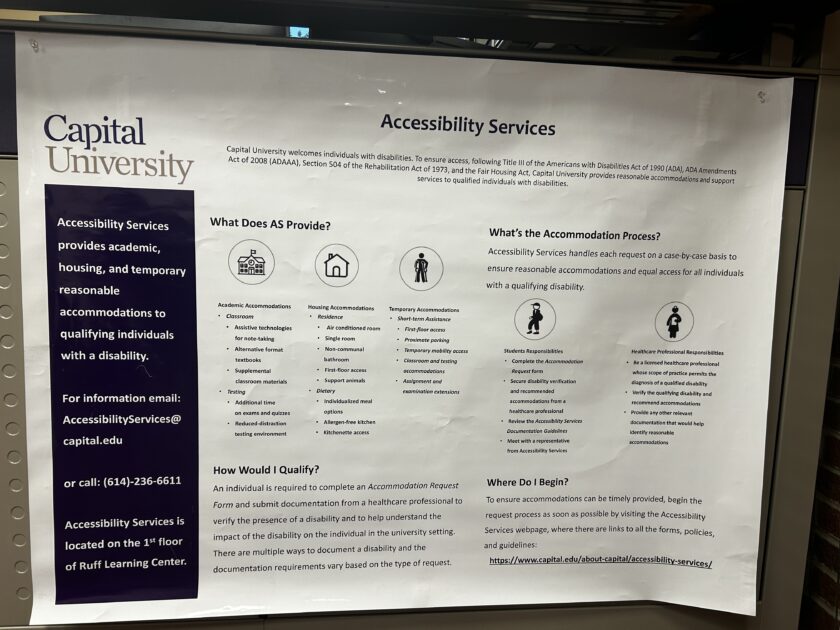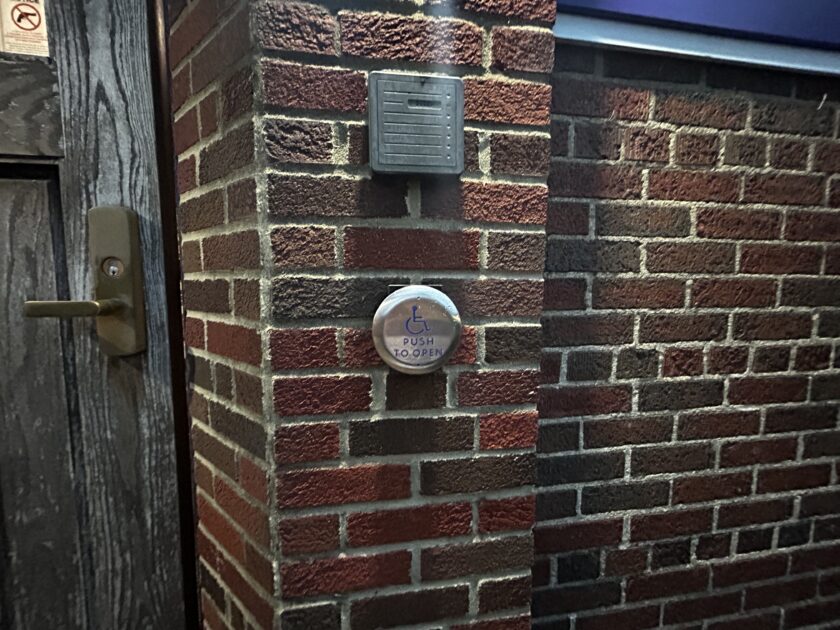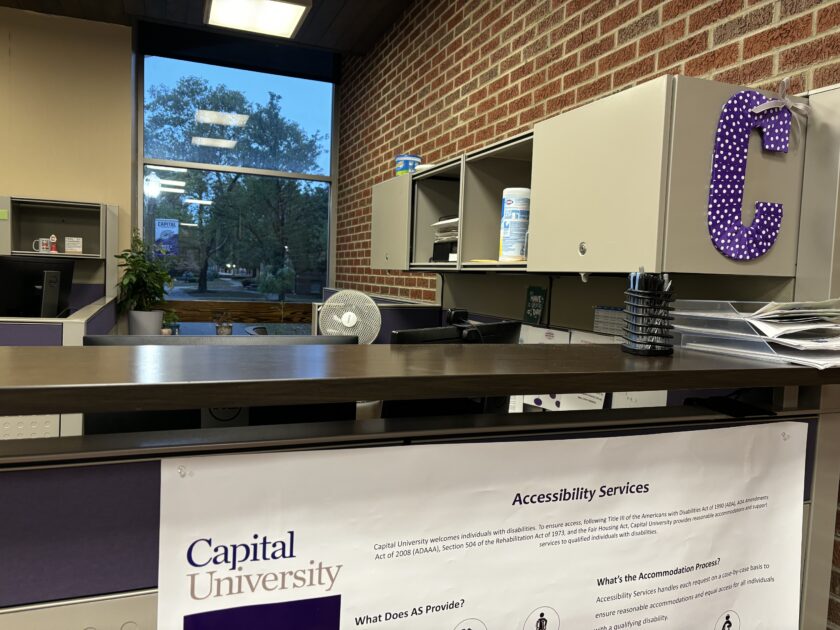Single resident housing, extended or silent testing space and emotional support animals are all among the various disability accommodations provided by the university’s Accessibility Services office.

According to the university’s statement regarding disability accommodations on campus, the Accessibility Services homepage cites Title III of the Americans with Disabilities Act (ADA) of 1990, ADA Amendments Act of 2008 and Section 504 of the Rehabilitation Act of 1973.
All articles prohibit the discrimination of individuals on the basis of disability in both public and private settings, including, “[requiring] newly constructed or altered places of public accommodation,” in the 1990 act, as well as “[emphasizing] that the definition of disability should be construed in favor of broad coverage of individuals to the maximum extent permitted by the terms of the ADA and generally shall not require extensive analysis,” in the 2009 amendment.
According to the homepage, “Capital University welcomes individuals with disabilities to be an integral part of the university community…Capital University provides reasonable accommodations and support services to qualified individuals with disabilities.”
For many students in need of accessibility accommodations, advocating for those services can often be a tedious and exhausting task, especially when the desired outcome is not met.
According to sophomore Megan Larkin, their accommodation request for a single room without extra cost was denied, despite having medical recommendations.
“I had Doctor recommendations,” Larkin said. “I had both my doctors, my psychiatrist and I had my therapist, who I was using from the school at the health and wellness center. They both signed.”
Larkin also added that the process felt invasive at times.
“They want to know everything, and I don’t always want to tell them.”
Junior Isabelle Hanning shares this sentiment with Larkin after going through a similar long, though successful, process with Accessibility Services following an ankle surgery.
“They sent me this big paper that they wanted my doctor to fill out specifically,” Hanning said, “[This] was a problem because he’s in Cincinnati, and he only has appointments every nine months. It’s because he’s… one of the only doctors for my specific treatment in the state.

“When I told her [Ashley LeMaster, director of Accessibility Services] that it was probably not going to be able to get filled out by that specific doctor, she asked for a list of things, such as to call my doctor herself, which made me uncomfortable, because I don’t want anyone talking to my doctor about me,” Hanning said.
Hanning’s experience came before the ankle surgery, and although she is now able to walk, she needs to live on the first floor and have access to the elevator.
Additionally, due to a medical condition that greatly weakens her immune system, Hanning needed a housing accommodation that allowed her to live alone.
“Initially, it wasn’t actually too difficult to get someone to talk to me. I had a Zoom meeting, I think, maybe a week and a half after I sent them my original email,” Hanning said. “It seemed fine, they said they were gonna get my accommodations, but then when it came to actually getting them, it became much more difficult.”
While promising “individualized services for students and faculty,” the university adds the stipulation that “individuals with disabilities who wish to receive services from AS (Accessibility Services) are responsible for disclosing their disability to AS and should complete the registration process at least 6 weeks prior to the desired start date for most services.”
LeMaster explains that while documentation can be necessary, it always remains confidential.
“I tell students, in the intake meetings, ‘share what you’re comfortable with sharing.’” LeMaster said. “The goal is to help us get a better understanding of what they’re going through, to help us make accommodation decisions.”
LeMaster assures that everything shared to Accessibility Services is electronically stored on file through a confidential system that few people have access to.
As far as what determines if an individual will be granted their requested accommodation, LeMaster said. “Diagnosis doesn’t always equate to disability. It’s more about the impact of it.”
“Someone might have a mental health related diagnosis, but the information we’re really looking for is how they’re impacted by that, because it can vary. Two people can have the same condition, but how it affects them and impacts them, in university life or academically, can vary completely,” LeMaster said.
As for difficulties in regard to issues obtaining single resident housing as an accommodation, LeMaster explains that individuals being granted singles as an accommodation is based on need, not availability.

“It’s a very common thing that’s requested,” LeMaster said. “When we look at accommodation requests, the nature of the disability and when we’re looking at granting accommodations, the point is to ensure that students have equal success. So if someone comes and says, ‘I can’t focus while having a roommate,’ usually that’s not rising to a level of access needed for a single room.”
In an age where mental health awareness has become more widespread, more students have become more comfortable requesting accommodations for their struggles.
LeMaster agrees this trend has had an impact on the number of requests in her office.
As awareness of mental health struggles continue to spread on campus, accommodation requests also continue to grow as students begin to seek out more help.
While Accessibility Services may struggle to meet the demand this new trend supplies, physically disabled students are receiving the necessary help.
First-year Calcifer Peters said the university is “honestly one of the more accessible campuses that I toured.”
“I have Ehlers Danlos Syndrome, and with that, I get frequent dislocations, and I have a few comorbid disorders with that,” Peters said, “But it all stems from the Ehlers Danlos, and I’ve requested accommodations for that. I also have a learning disability as well as ADHD, and I’ve requested accommodations for those as well.”
Peters explained the importance of a bigger housing accommodation for them because of incidents like falls, where extra room would be beneficial for their safety should something happen.
Peters said Accessibility Services even helped them get accommodations they didn’t know were possible.
“I can record my lectures, which they had told me about.” Peters said. “I also have difficulty with my hands, and so I was looking for accommodations regarding that and they put me in the right direction with text to speech assistance… They were lovely about that.”
While Peters’ accommodations experience has been satisfactory, they still have concern for overall campus accessibility.
As far as that concern, Director LeMaster shares plans to increase this accessibility for the coming academic year.
“We’ve been trying to work closely with [facilities] on improvements, adding in more automatic openers to the dorm rooms, fixing the automatic door openers and elevators… as soon as we know there’s a problem. That’s definitely an ongoing issue on campus that we’re still working on addressing,” LeMaster said.
The office of Accessibility Services is also working on support and awareness programs run by students with disabilities.
Peters is a founding member of this venture.
“Anyone can become disabled at any time. That’s why accessibility is so important to me,” Peters said. “Me and some friends are making a group for disabled students to be able to more directly voice their opinions on campus.”
Disabilities studies professor Dr. Nate Whelan-Jackson distinguishes that the process of making disabilities known and accommodated can be difficult for anyone, anywhere, not just the university.
“On the broader societal level, going through the disability determination process, you’re being put in this position where you’re trying to justify what others might appear to be, like a unique treatment,” Whelan-Jackson said.
More streamlined Accessibility Services applications, improved accessibility on campus and general greater support and acknowledgement of students who are fighting for their needs to be met, will all be a continuing work in progress for the university.

